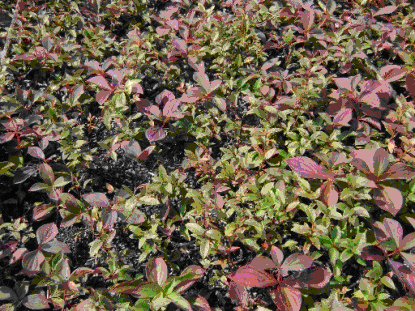255-Tribenuron Methyl for Bunchberry Control in Wild Blueberries
Fact Sheet No. 255, UMaine Extension No. 2146
Prepared by David E. Yarborough, Extension Blueberry Specialist, and Jennifer L. D’Appollonio, Research Assistant, The University of Maine, Orono, ME 04469. February 2009.
NOTICE: It is unlawful to use any pesticide for other than the registered use. Read and follow the label on the product container. The user assumes all responsibility for use inconsistent with the label.
WARNING! Pesticides are potentially hazardous. Handle carefully! Read and follow all directions and precautions on labels. Store in original labeled containers out of reach of children, pets, and livestock. Dispose of empty containers at once, in a safe manner and place. Do not contaminate forage, streams, ponds or groundwater recharge areas. Trade names are used for identification. No product endorsement is implied, nor is discrimination intended against similar materials. Cooperative Extension makes no warranty or guarantee of any kind concerning the use of these products
Introduction
Tribenuron methyl has a trade name as Express Herbicide with TotalSol soluble granules manufactured by DuPont, has been granted a Special Local Need 24(C) label in Maine for bunchberry (Cornus canadensis) control in wild (lowbush) blueberries for 2008 and 2009. By using Express herbicide, the grower accepts all risk regarding possible crop injury to wild blueberry. This factsheet has been prepared to provide growers with additional information about the use of this product. You should refer to the product label and you should have both the Federal product label and the special local need 24(C) label in your possession when applying this product.
Mode of Action
Express is a selective herbicide used for postemergence broadleaf weed control. It is absorbed through the foliage, rapidly inhibiting growth. Leaves will appear chlorotic (reddish or yellowish) one to three weeks following application and will subsequently die if they take up enough of the herbicide. Note that reddening of bunchberry is also seen after harvest, especially in fields harvested mechanically. Wild blueberry plants that are stressed due to extreme moisture or temperature, abnormal soil conditions, disease, insect damage or cultural practices may be injured, so Express should not be applied under any of these conditions. Also, weeds that are hardened off by drought stress are less susceptible to Express Weed control is also reduced if rain or snows falls shortly after application; therefore, several hours of dry weather are needed for Express to be fully absorbed by foliage. In warm moist conditions, herbicide action is accelerated, while in cold dry conditions it is delayed. Extended periods of cool weather (daily high less than 50°F) or large fluctuations in day to night temperatures, just prior to or soon after application, may result in temporary crop yellowing and/or stunting. Degree and length of effectiveness are influenced by the size and sensitivity of the bunchberry plants, the rate used, and environmental conditions at and after herbicide application.
General Herbicide Application Recommendations
A uniform broadcast spray using flat-fan or low-volume flood nozzles is recommended. For best results, use nozzles and pressures that result in medium-size droplets. For flat-fan nozzles, use a spray volume of 20 GPA For optimal coverage and minimal drift, adjust the spray boom to the lowest height recommended by the manufacturer. “Raindrop RA” nozzles are not recommended as weed control may be reduced. Screens that are 50-mesh or larger should be used.
Application on Bunchberry in Wild Blueberry Fields
Apply Express at 0.8 to 1.0 oz./a in the fall to cropping fields only after blueberry harvest. There must be a minimum of 365 days between the application and the next harvest. Because Express will only control bunchberry when adsorbed by its leaves, spray applications should only be made to portions of the field where bunchberry is present. The herbicide may be used until a killing frost occurs, after which bunchberry will not be controlled. Do not apply more than 1.0 ounce per acre in one growing season. Applied earlier in the fall, Express results in increased bunchberry control and increased blueberry cover the next year. A nonionic surfactant (NIS) of at least 80% ai should always be used at a rate of 0.25% v/v (1 qt./100 gal solution). Methylated seed oil (MSO) and crop oil concentrate (COC) should never be used, as they may result in unacceptable crop injury.
There are no tank mixes specifically listed for use on bunchberry or wild blueberry. Prune plants in the fall after frost or early in the spring the following year as delayed pruning may result in increased wild blueberry injury.
Read and follow all manufacturers’ label directions, recommendations, and precautions for mixing with herbicides, fungicides and/or insecticides.

Information in this publication is provided purely for educational purposes. No responsibility is assumed for any problems associated with the use of products or services mentioned. No endorsement of products or companies is intended, nor is criticism of unnamed products or companies implied.
© 2009
Call 800.287.0274 (in Maine), or 207.581.3188, for information on publications and program offerings from University of Maine Cooperative Extension, or visit extension.umaine.edu.
The University of Maine is an EEO/AA employer, and does not discriminate on the grounds of race, color, religion, sex, sexual orientation, transgender status, gender expression, national origin, citizenship status, age, disability, genetic information or veteran’s status in employment, education, and all other programs and activities. The following person has been designated to handle inquiries regarding non-discrimination policies: Director of Equal Opportunity, 101 Boudreau Hall, University of Maine, Orono, ME 04469-5754, 207.581.1226, TTY 711 (Maine Relay System).
